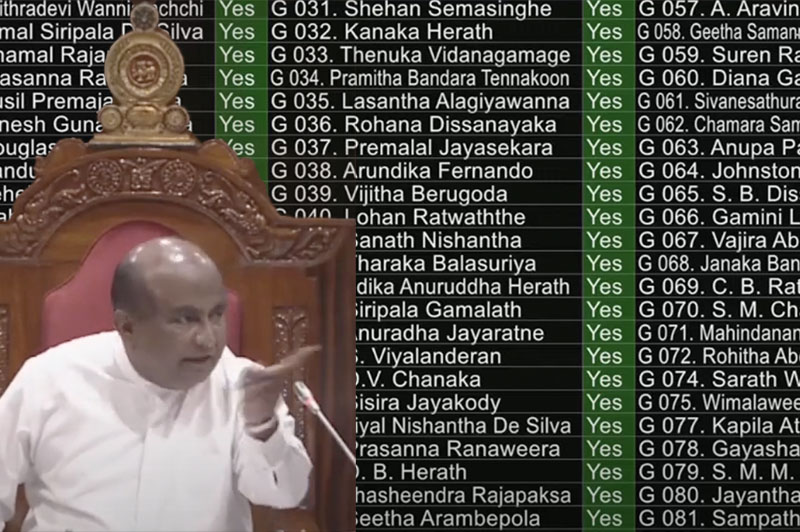The vote on the no-confidence motion against Speaker of the Parliament Mahinda Yapa Abeywardena, was defeated in the Parliament today (March 21), following a three-day debate.
The Speaker survived the no-confidence motion, moved by the Samagi Jana Balawegaya (SJB), by a majority of 42 votes.
A total of 117 lawmakers had voted against the motion while 75 voted in favour.
Accordingly, Mahinda Yapa Abeywardena will continue to function as the Speaker of the Parliament of Sri Lanka.
The third day of the parliamentary debate on the no-confidence motion against the Speaker commenced at 09.30 a.m. this morning.
The parliamentary debate on the no-confidence motion tabled by the Samagi Jana Balawegaya (SJB) was initially slated to be held for two days, however the Committee on Parliamentary Business later decided for it to be debated for three consecutive days.
The debate commenced in the Parliament on Tuesday (March 19).
The motion brought forth by the opposition against the Speaker was officially handed over to the Deputy General Secretary of Parliament on March 05.
It had been signed by 44 parliamentarians including Opposition Leader Sajith Premadasa, Chief Opposition Whip Lakshman Kiriella and MPs Prof. G.L. Peiris, Rohini Kumari Wijeratne, Hesha Vithanage, Mano Ganesan, Rishad Bathiudeen, M.A. Sumanthiran, S.M. Marikkar, Ranjith Madduma Bandara, Thalatha Atukorale, Vijitha Herath and Chandima Weerakkody.
The no-confidence motion alleges that the Speaker had ignored the Supreme Court’s recommendations pertaining to Sections 13, 17, 20, 33 (6), 34 (1), 35 (1), 21, 22 and 33 of the Online Safety Bill.
The Speaker is also accused of allowing the third Reading of the Online Safety Bill to be passed without a vote and disregarding the Chief Opposition Whip’s call for a division at the Committee Stage.
Further, the opposition MPs claim that the Speaker had ‘unconstitutionally and unlawfully’ used his decisive vote to affirm the appointment of IGP Deshabandu Tennakoon when the other members of the Constitutional Council were divided on a tie on the matter. It was reported that four members had voted in favour of the appointment while 2 voted against and 2 others abstained. However, considering the 2 abstentions as votes cast against, the Speaker had used his vote as the deciding vote to go ahead with the appointment, they allege.





